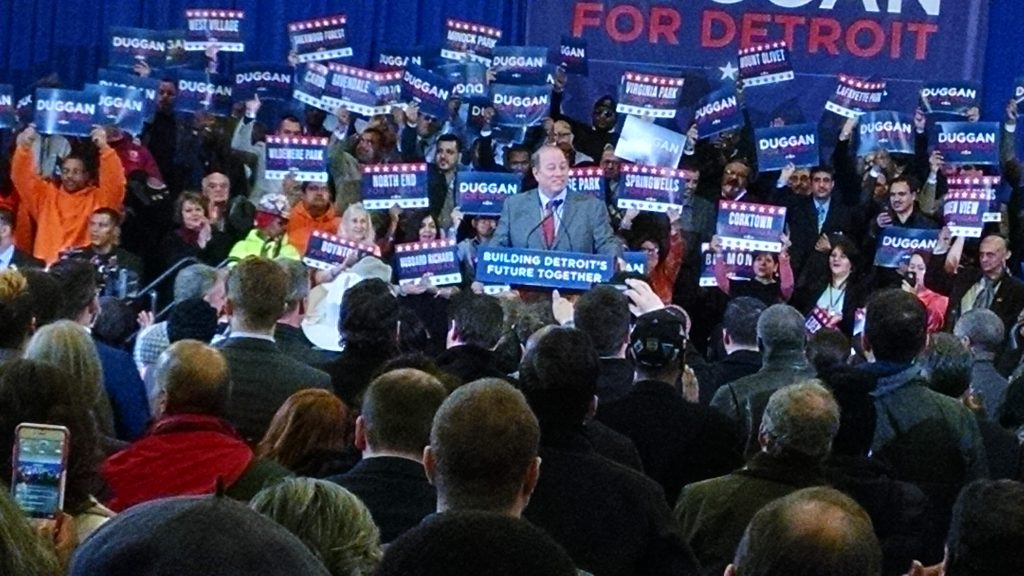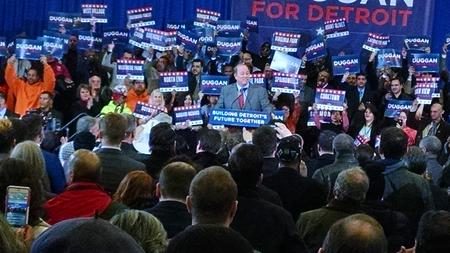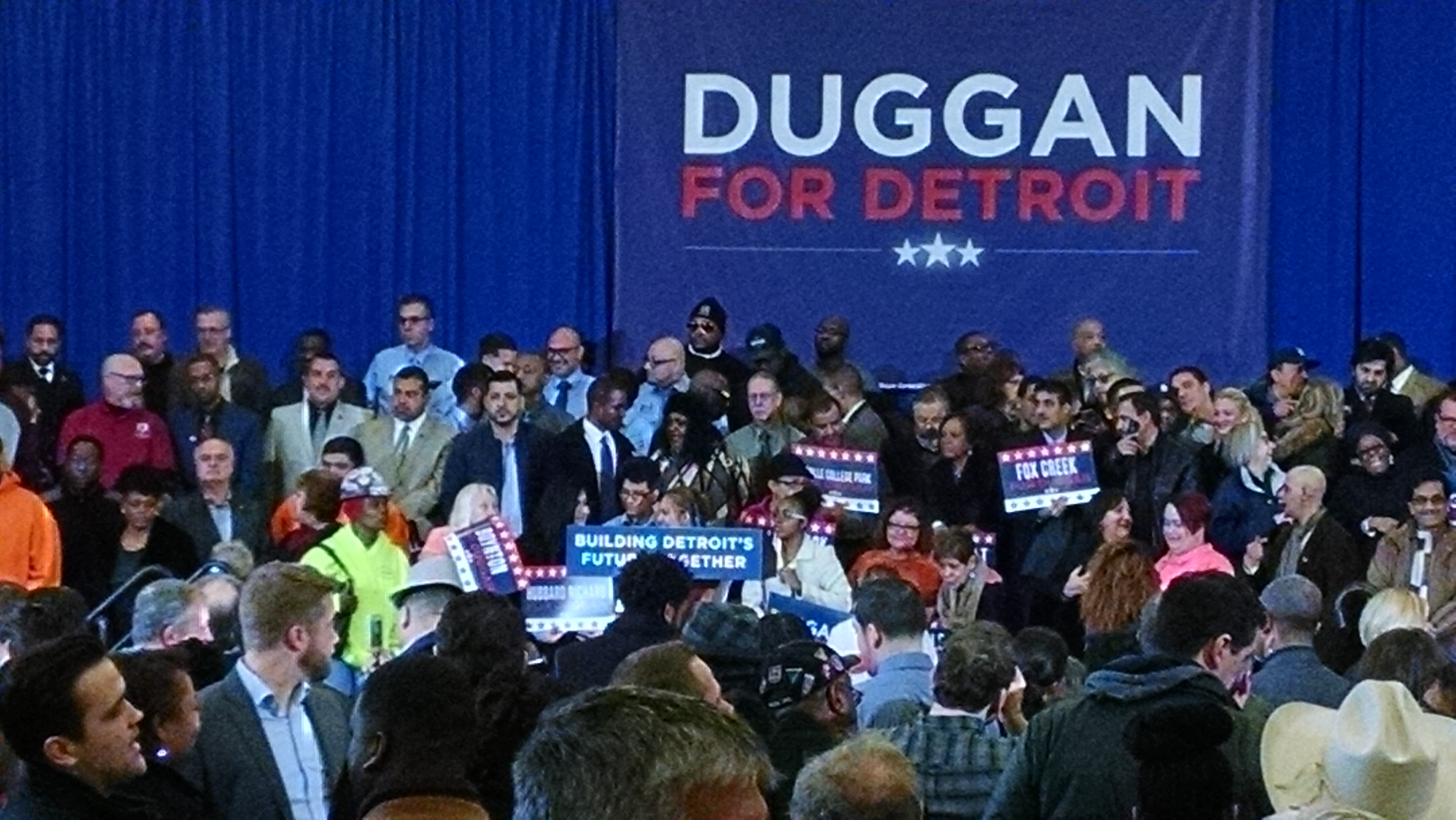Duggan Seeks Re-Election
Detroit Mayor Mike Duggan wants another four years to continue progress, focus on families.

Promising to fight the state’s proposed closure of Detroit schools and celebrating the partnerships and progress made in the city, Mayor Mike Duggan today said he’s running for a second term.
“What we‘ve done we’ve done together, and I’d like to continue that,” he said. “I am going to run for re-election in 2017.”

In an auditorium crowded with hundreds of people at The Samaritan Center on the city’s east side, Duggan’s announcement followed a series of introductory speakers, many of who have contributed financially to his campaign. Wayne County Sheriff Benny Napoleon, who ran against Duggan in the last mayoral election, also was on the stage pledging his support.
Duggan, wearing a grey striped suit and a red tie, promised his campaign and second term would look forward:
“This is going to be a different kind of campaign. This isn’t going to be a victory-lap kind of campaign,” he said. “Many of the things that we’re celebrating wouldn’t be celebrated in other cities.”
He described how residents have thanked him for regular garbage pickup, grass cutting in parks, and street lights being on.
“In other cities that’s expected, “he said. “Nobody calls you from Chicago and says, ‘It’s a great day. My street lights came on. We need to get to the point in Detroit where we expect those things. That’s when we’re going to be a great city.”
In his remarks, Duggan lauded the City Council and city employee unions for helping make improvements, but warned, “We’ve got a lot left to do.”
He set a clear goal for his next term:
“Now that we’ve got the services going reasonably well, we’re going to work every day to create a city that people want to raise their families in,” he said.
During his first term, Duggan said unemployment has fallen, business have opened, and young people have moved to the city. But that’s not enough.
“We’ve got to make it a great city where people say, ‘I just had to come with kids. I want to look at houses in the city of Detroit and that’s where I want to raise my family.’ These are the things we’re going to talk about in this campaign,” he said. “We haven’t fixed it all in three years.”
His three specific goals for the future: public safety, opportunities for young people, and quality public schools.

HIS FIRST TERM
Voters elected Duggan in November 2013 as the city was in the first trimester of its historic bankruptcy. A few months earlier Duggan’s chances of winning the seat seemed low: he had officially moved to Detroit in time to run, but did not register to vote until a month later which left him two weeks short of the one-year residency requirement to appear on the ballot. So he ran a write-in campaign and finish as one of the top two vote-getters in the August primary, moving him along to the general election.
Duggan won in November by a 55-45 margin over Wayne County Sheriff Benny Napoleon. Campaign finance records show Duggan raised about $3 million toward that effort.
While in office, Duggan has not stopped collecting financial support for his campaign committee. Campaign finance records show donors from throughout Michigan and 30 states since 2015.
“I don’t know anybody who doesn’t raise money as they go along,” Duggan told WDET in December.
Duggan, a former Wayne County prosecutor and chief executive at the Detroit Medical Center, started his tenure as Detroit’s top elected official with a boss, of sorts. The state-appointed Emergency Manager, Kevyn Orr, was in charge, and Duggan had little power until Orr granted it.
The two have described their first few months in city hall together as tenuous, but through regular dinners, a shared alma mater of the University of Michigan, and a shared goal of ending Detroit’s fiscal crisis, the two regularly appeared together in public and were friendly.
While the emergence from bankruptcy was clearly a goal, Duggan also spelled out his first-term agenda early in his tenure. Shortly after his election, he told a crowd that his time in office should be judged by whether people wanted to live in Detroit:
“Today I want to talk to all those people who are thinking right now of moving out,” he said. “Just give us six months. Give us six months to prove that we can turn things around. Just push the ‘pause’ button and don’t leave that house yet. Give us six months and let us prove to you what we can do.”
He often said he should be judged on whether Detroit gains population, and while Census figures have shown the city’s decades-long loss of people has slowed, it has continued.
But Duggan in the last several months has continued his optimism. The city, he says, will soon show an increase in residents because of his administration’s efforts to beautify neighborhoods and lure investment to Detroit’s downtown area.
He also notes, in his public appearances, that the city has demolished more than 10,000 blighted buildings since 2014. But that program is under federal investigation. Questions have been asked about why the cost of tearing down houses seemed to increase dramatically since Duggan became mayor. This week, state officials said more than $7.3 million of those funds was used improperly but Duggan has countered that only $1.3 million was incorrectly accounted for.
During his announcement Duggan did not mention the controversy. But he told WDET later that he is not concerned about the federal probe.
And neither, Duggan said, are prospective voters in Detroit.
“I’m in these house parties every week and the only question I ever get asked is, ‘When are you getting to the demolitions in my neighborhood?’ So I think people recognize we made mistakes by trying to go too fast. And I think people in Detroit will recognize that. It’ll be fine,” Duggan said.
